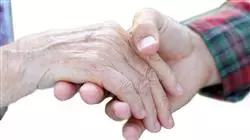University certificate
The world's largest faculty of medicine”
Description
Improve your attitudes and relationship skills with patients and family members, helping them cope with grief"

Developing a plan for dying with dignity helps people determine how they want to reach the end of their lives. This is often a difficult time for the patient, the patient's family and sometimes for the medical team involved. For this reason, psycho-oncology offers a set of tools that provide the necessary information to alleviate the grieving process.
In this Postgraduate Certificate in Protocols for Emotional Intervention at the End of Life you will learn about the protocols that are applied to provide palliative care to patients who have received an unfavorable diagnosis. To this end, a series of empirical and spiritual approaches will be taken into account to ensure a multidisciplinary approach to the program. In relation to the above, the spiritual approach has come to be considered indispensable to safeguard the beliefs of the mourners, guaranteeing their individuality in this process. This helps to alleviate the pain and uncertainty experienced in such a situation.
At the end of the program, the student will be able to apply the appropriate techniques to treat their patients, making this program an excellent opportunity to lead the physician towards a more humane and individualized treatment.
Deal with complex situations, such as the death of lonely patients, where you are their only companion"
This postgraduate certificate in Protocols for Emotional Intervention at the End of Life contains the most complete and up-to-date educational program on the market. The most important features are:
- Practical cases presented by experts in Psycho-Oncology
- The graphic, schematic, and eminently practical contents with which they are created, provide scientific and practical information on the disciplines that are essential for professional practice
- Practical exercises where the self-assessment process can be carried out to improve learning
- Special emphasis on innovative methodologies for psychological intervention with cancer patients
- Theoretical lessons, questions to the expert, debate forums on controversial topics, and individual reflection assignments
- Content that is accessible from any fixed or portable device with an Internet connection
Family members of patients can suffer a lot after a terminal diagnosis. Work with them to face their future grief”
The program’s teaching staff includes professionals from the sector who contribute their work experience to this training program, as well as renowned specialists from leading societies and prestigious universities.
The multimedia content, developed with the latest educational technology, will provide the professional with situated and contextual learning, i.e., a simulated environment that will provide immersive training programmed to train in real situations.
This program is designed around Problem Based Learning, whereby the professional must try to solve the different professional practice situations that arise during the academic year. For this purpose, the student will be assisted by an innovative interactive video system created by renowned and experienced experts.
Address your patient's beliefs to ensure their peace of mind throughout the process towards the end of their life"

At this point in the illness, intervention should focus on addressing feelings of fear, guilt and sadness"
Objectives
This postgraduate certificate in Protocols for Emotional Intervention at the End of Life will help clinicians meet the psychological needs of patients and their families. Therefore, it becomes a complete program that will favor the professional's ability to act appropriately in bereavement situations. Thanks to this, the student will make an exhaustive review of the protocols that are activated before a terminal diagnosis of the patient, as well as respect for the beliefs of the person to improve their relationship with death.

As a physician, you must also take care of your mental health and avoid burnout syndrome"
General Objectives
- Gain in-depth knowledge of the different therapeutic options in the psychological treatment of cancer
- Contribute to the control of mood alterations through appropriate psychological strategies
- Know how to assess and intervene in adaptive and maladaptive emotions and behaviors
Specific Objectives
- Perform preventive care actions for the family according to the stages of the disease
- Address conflicts that may arise as a result of different socio-cultural beliefs and values between the team and the patient-family binomial
- Recognize and respond to spiritual distress and know how to refer the patient to the appropriate professional
- Develop appropriate assessments of the overall importance of the patient's spiritual beliefs and religious practices
- Manage the attitudes and responses of patients, caregivers and professionals derived from the professional-patient relationship
- Know how to intervene in particularly complex family situations
- Be able to work in cooperative groups and multi-professional teams

Children with a terminal diagnosis require special work to help them understand what is happening"
Postgraduate Certificate in Protocols for Emotional Intervention at the End of Life
According to several studies, about 40% of Cancer patients in complicated situations experience depressive symptoms that can affect their ability to make decisions. Therefore, it is important that they have access to a professional who can help them understand what is happening and make decisions to face the end of their life with dignity. And this Postgraduate Certificate in Emotional Intervention Protocols at the End of Life will prepare you for this with all the guarantees.
It realizes preventive actions of care to the family according to the stages of the disease.
Through this Postgraduate Certificate in Emotional Intervention Protocols at the End of Life, you will develop preventive measures and you will deal with negative attitudes in the face of a terminal diagnosis. In this way, you will be able to apply the necessary palliative protocols, promoting the development of plans for a dignified death. Undoubtedly, a program of great medical and ethical value with which you will take another step forward in your career. And always from a comfortable online mode, in which you will manage the academic resources according to your personal and professional obligations. In this way, it is a highly compatible program in which you will obtain a high level of preparation in only 150 hours.







